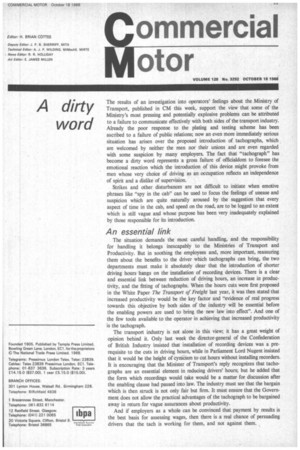A dirty word
Page 27

If you've noticed an error in this article please click here to report it so we can fix it.
The results of an investigation into operators' feelings about the Ministry of Transport, published in CM this week, support the view that some of the Ministry's most pressing and potentially explosive problems can be attributed to a failure to communicate effectively with both sides of the transport industry. Already the poor response to the plating and testing scheme has been ascribed to a failure of public relations; now an even more immediately serious situation has arisen over the proposed introduction of tachographs, which . arc welcomed by neither the men nor their unions and are even regarded with some suspicion by many employers. The fact that "tachograph" has become a dirty word represents a gross failure of officialdom to foresee the emotional reaction which the introduction of this device might provoke from men whose very choice of driving as an occupation reflects an independence of spirit and a dislike of supervision.
Strikes and other disturbances are not difficult to initiate when emotive phrases like "spy in the cabcan be used to focus the feelings of unease and suspicion which are quite naturally aroused by the suggestion that every aspect of time in the cab, and speed on the road, are to be logged to an extent which is still vague and whose purpose has been very inadequately explained by those responsible for its introduction.
An essential link
The situation demands the most careful handling, and the responsibility for handling it belongs inescapably to the Ministries of Transport and Productivity. But in soothing the employees and, more important, reassuring them about the benefits to the driver which tachographs can bring, the two departments must make it absolutely clear that the introduction of shorter driving hours hangs on the installation of recording devices. There is a clear and essential link between reduction of driving hours, an increase in productivity, and the fitting of tachographs. When the hours cuts were first proposed in the White Paper The Transport of Freight last year, it was then stated that increased productivity would be the key factor and "evidence of real progress towards this objective by both sides of the industry will be essential before the enabling powers are used to bring the new law into effect". And one of the few tools available to the operator in achieving that increased productivity is the tachograph.
The transport industry is not alone in this view; it has a great weight of opinion behind it. Only last week the director-general of the Confederation of British Industry insisted that installation of recording devices was a prerequisite to the cuts in driving hours, while in Parliament Lord Nugent insisted that it would be the height of cyniCism to cut hours without installing recorders. It is encouraging that the Minister of Transport's reply recognizes that tachographs are an essential element in reducing drivers' hours; but he added that the form which recordings would take would be a matter for discussion after the enabling clause had passed into law. The industry must see that the bargain which is then struck is not only fair but firm. It must ensure that the Government does not allow the practical advantages of the tachograph to be bargained away in return for vague assurances about productivity.
And if employers as a whole can be convinced that payment by results is the best basis for assessing wages, then there is a real chance of persuading drivers that the tach is working for them, and not against them.
























































































































